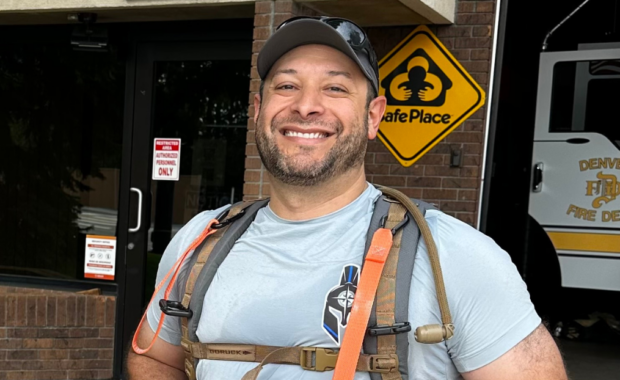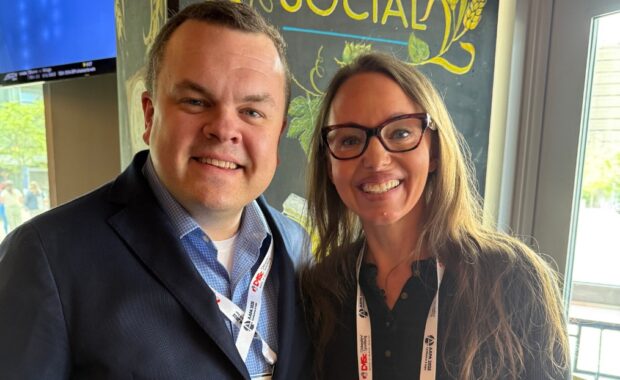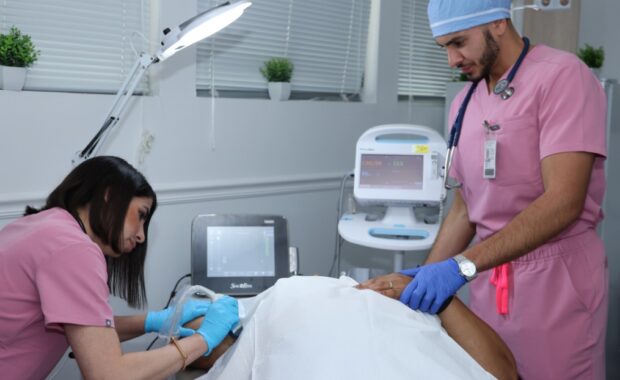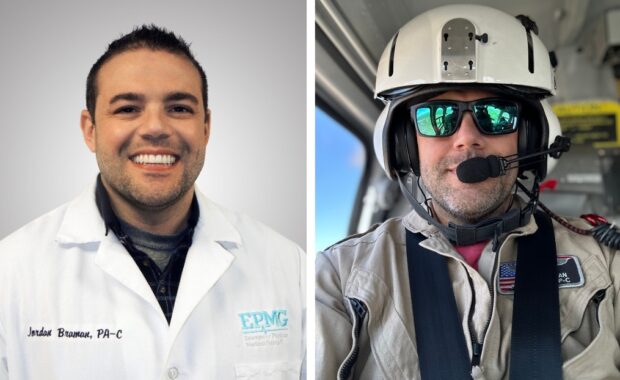Patient-Provider Trust is Key for Street Medicine PA Sam Halajian
Sam Halajian Takes His Services to the Streets
February 20, 2024
By Dave Andrews
Going from the “big screen” of TV and movie production to a lower-profile profession providing healthcare is a lot more than just a career pivot—it’s a life changer. But PA Sam Halajian wasn’t focused on changing his life, as much as he was determined to impact the lives of others.
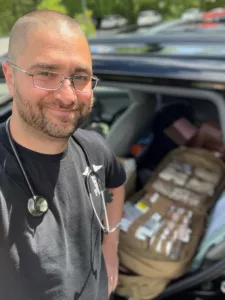
Instead of setting scenes, Halajian is saving lives in numerous ways. For the past year, he has been one of the primary street medical providers in Saratoga Springs, New York.
Each week, he dedicates at least eight hours away from his full-time primary care role at the Saratoga Community Health Center to delivering care to the growing number of people in the area experiencing homelessness. When making his rounds, Halajian will typically issue prescription refills, address wounds, and treat infections, among many other duties that he would otherwise do in the office.
“I never saw myself, especially back when I was in film school, as someone who would be in this type of role,” Halajian said. “But I’ve always been drawn to a sense of service, to be part of something bigger than myself and to be able to contribute to my community.”
Bridging a Gap
Saratoga Springs has seen a recent influx in the number of people experiencing homelessness, says Victoria Fufaro, director of outreach and advocacy at Rise Housing and Support Services. And much of that growth occurred shortly after the pandemic when apartment prices jumped. The rapid rise in numbers put additional strain on an already limited amount of healthcare resources.
“That’s why having Sam out there has been so critical,” Fufaro said. “He goes to find patients wherever they are, whether that’s a parking garage, in the forest, or wherever there’s an encampment. And if they eventually move into an apartment, he’ll continue to see them there.”
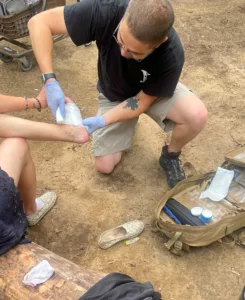
In addition to the variety of acute cases he manages, many of Halajian’s patients are suffering from behavioral health issues or struggling with addiction. Halajian says if these cases continued to go untreated, they would become progressively difficult to treat.
“They’re much less likely to make their appointments and it gets harder and harder for us to track them down,” Halajian said. “But in this role, I can help bridge that gap by simply getting to know them and then prescribing the right medicines to help them get back on track.”
Building Trust
Because a large portion of people experiencing homelessness haven’t seen a provider in well over a decade, Fufaro says many are highly wary of healthcare professionals. But through Halajian’s consistent visits and caring approach, he’s quickly established himself as a trustworthy provider.
“All of the clients are particularly receptive to him,” Fufaro said. “He makes them feel comfortable because he treats them like they’re at the same level instead of him seeming like a higher-up figure in a medical office. His approach is just tremendous and without him, I really don’t know what we would do.”
Halajian attended the military’s Interservice Physician Assistant Program, which requires graduates to complete a total of eight years of service in the reserves. Halajian says his time in the military has not only given him valuable experiences to lean on, but it’s also something that helps him connect with his patients, many of whom are veterans.
“A lot of it is building connections with these people, getting them to trust me and see that I truly care,” Halajian said. “Once that trust is built, then we can get into the nitty gritty details to help them manage their health and eventually transition them into coming into the office.”
Providing Stability
The goals of expanding access to care through street medicine are not only to improve health outcomes but to provide a small sense of continuity in an otherwise volatile and unpredictable environment. Dr. Sophia Conroy, a primary care physician at Saratoga Community Health Center who works closely with Halajian, says she has several patients who suddenly lost their housing, which disrupted their entire lives.
“Losing your home changes everything, and it makes it very hard for them to continue navigating care effectively,” Conroy said. “But Sam will pick up that thread to go out to find those patients and provide them with the care they need for as long as it takes. From a continuity of care, that is very important.”
Conroy adds that people who are experiencing homelessness or who are struggling with addiction often face a significant amount of bias. But Halajian has the ability to help them quickly feel at ease because they sense his sincerity.
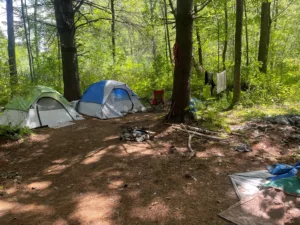
“It’s a combination of having integrity and a strong work ethic, being a good listener and not passing judgement on anyone,” Dr. Conroy said. “He lets the patient talk. He listens intently and he meets them where they’re at. People respect that.”
Halajian is not only treating patients in the streets; he’s also educating other members of the street outreach teams on basic triage techniques such as identifying rashes and infections, dealing with sunburns and dehydration, and knowing when to call an ambulance.
In a relatively short period of time, the street medicine initiative in Saratoga Springs has helped reduce the overuse of emergency departments. And collaborators are developing plans to expand the program in the near future.
“Additional funding from the community is already coming forward because people are seeing the work that Sam is doing, they’re seeing the difference that it’s making—These people aren’t struggling as much as they once were,” said Kathy McNeice, associate director of the Saratoga Community Health Center who oversees the center’s street outreach in collaboration with the social services groups across the region.
Although McNiece acknowledges providing street medicine is “not for the faint of heart,” she says the service is vital to the community. Saratoga Community Health Center has plans to integrate street outreach into its resident training program for family medicine.
“The unique skills that Sam has and that other providers can develop will continue to have a tremendous impact on the lives of so many,” McNiece said. “It’s amazing how much progress has already been done, and we know so much more can be accomplished in the years ahead.”
Dave Andrews is a freelance writer and public relations professional based in Northern Virginia. Contact him at [email protected].
Editor’s Note: This article was originally published in May, 2023.
You May Also Like
PA James “Rick” Kilgore Prepares to Attend His 41st Consecutive AAPA Conference
Major Marc Latta Focuses on Transformation
Cardiology PA Viet Le Helps Pave the Way for More PA Researchers
Thank you for reading AAPA’s News Central
You have 2 articles left this month. Create a free account to read more stories, or become a member for more access to exclusive benefits! Already have an account? Log in.
